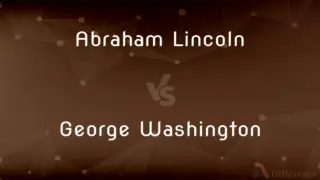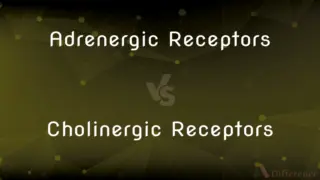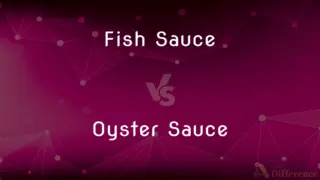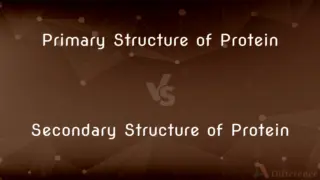Seminar vs. Tutorial — What's the Difference?
Edited by Tayyaba Rehman — By Urooj Arif — Updated on April 8, 2024
A seminar is a formal presentation or lecture, often focusing on a specific topic for discussion, while a tutorial is a personalized, interactive session aimed at teaching or solving specific problems.

Difference Between Seminar and Tutorial
Table of Contents
ADVERTISEMENT
Key Differences
Seminars are typically conducted by experts or academics who present on a particular subject to an audience that is interested in the topic. These sessions are often interactive, allowing for questions and discussions, but the primary mode of delivery is through the expert's presentation. Seminars can cover a wide range of subjects and are used for sharing research findings, exploring theoretical concepts, or discussing practical applications. On the other hand, tutorials are more personalized and interactive, usually involving a smaller group of students. The purpose of a tutorial is to teach specific skills, solve problems, or clarify doubts regarding subject matter. Tutorials offer a more hands-on learning experience, often tailored to the individual needs of the participants.
While seminars are generally more formal and may involve larger groups, tutorials are informal and encourage a closer interaction between the instructor and the participants. Seminars aim to impart knowledge or share insights on a particular topic, making them suitable for academic conferences, professional development, and public lectures. Tutorials, however, focus on the application of knowledge, skill development, and personalized feedback, making them ideal for academic courses, professional training, and skill enhancement workshops.
In terms of structure, seminars usually follow a predetermined agenda with a set time for presentations and possibly a question-and-answer session towards the end. Tutorials are more flexible, often adapting to the needs of the participants and fostering an environment where students can work through problems, ask questions, and engage in discussions freely. This adaptability makes tutorials particularly effective for deepening understanding and enhancing skills in a specific area.
The role of the presenter or instructor also differs between the two. In seminars, the presenter is the central figure, delivering information and leading the discussion. In tutorials, the instructor acts more as a guide or facilitator, helping students to explore the subject matter more independently and providing support and clarification when needed.
The choice between a seminar and a tutorial depends on the objectives of the session, the size of the group, and the level of interaction desired. Seminars are best suited for disseminating information and fostering discussion among a wider audience, while tutorials are more effective for hands-on learning and personalized instruction.
ADVERTISEMENT
Comparison Chart
Purpose
To share knowledge, discuss ideas
To teach skills, solve problems
Format
Formal presentation, discussion
Interactive, hands-on session
Interaction Level
Moderate, Q&A sessions
High, personalized feedback
Audience Size
Larger groups
Small groups or individuals
Delivery
Expert-led presentations
Instructor-guided activities
Focus
Theoretical concepts, research findings
Practical application, skill development
Compare with Definitions
Seminar
A session led by a specialist for a group discussion.
The seminar on digital marketing trends attracted many professionals.
Tutorial
A teaching method that emphasizes one-on-one interaction.
His guitar skills improved significantly after attending tutorials.
Seminar
A conference or meeting for discussion or training on a specific topic.
The university hosted a seminar on climate change impacts.
Tutorial
A period of instruction given by a tutor to an individual or very small group.
The math tutorial helped her understand complex equations.
Seminar
A gathering for the purpose of sharing research findings.
The seminar provided a platform for scholars to discuss their work.
Tutorial
An interactive session focusing on problem-solving.
The tutorial session addressed common software programming challenges.
Seminar
A formal presentation by an expert in a specific field.
He gave a seminar on the latest developments in renewable energy.
Tutorial
A session designed to assist students in learning specific skills.
The photography tutorials were instrumental in mastering lighting techniques.
Seminar
An academic class focused on a particular subject or project.
She enrolled in a seminar for advanced studies in psychology.
Tutorial
An opportunity for personalized learning and feedback.
The weekly tutorials were key to completing her thesis successfully.
Seminar
A seminar is a form of academic instruction, either at an academic institution or offered by a commercial or professional organization. It has the function of bringing together small groups for recurring meetings, focusing each time on some particular subject, in which everyone present is requested to participate.
Tutorial
A tutorial, in education, is a method of transferring knowledge and may be used as a part of a learning process. More interactive and specific than a book or a lecture, a tutorial seeks to teach by example and supply the information to complete a certain task.
Seminar
A course of study for a small group of students in a college or graduate school, often entailing research under the guidance of a professor.
Tutorial
Of or relating to tutors or a tutor.
Seminar
The group of students in such a course.
Tutorial
A book or class that provides instruction in a particular area.
Seminar
A scheduled meeting of such a group.
Tutorial
(Computers) A program that provides instruction for the use of a system or of software.
Seminar
A meeting for an exchange of ideas; a conference.
Tutorial
Of or pertaining to a tutor; belonging to, or exercised by, a tutor.
Seminar
A class held for advanced studies in which students meet regularly to discuss original research, under the guidance of a professor.
Tutorial
A self-paced learning exercise; a lesson prepared so that a student can learn at their own speed, at their convenience.
Seminar
A meeting held for the exchange of useful information by members of a common business community.
Tutorial
An interactive class taught by a tutor to students at university or college, individually or in small groups.
Seminar
A group of students engaged, under the guidance of an instructor, in original research in a particular line of study, and in the exposition of the results by theses, lectures, etc.; - formerly called also seminary, now seldom used in this sense.
Tutorial
(computing) A video or text that is basically a how-to (advice or instruction on a particular topic)
Seminar
Any meeting for an exchange of ideas
Tutorial
Of or pertaining to a tutor; belonging to, or exercised by, a tutor.
Seminar
A course offered for a small group of advanced students
Tutorial
A class{6} or short series of classes in which one or more instructors provide intensive instruction on some subject to a small group. Such short courses of instruction may be held at an institution of learning, or in any other place where a small group may desire a brief but thorough introduction to a topic.
Tutorial
A set of instructions on how to use a particular computer program, built into the software package itself, displayed on the computer screen, and organized in a stepwise manner so as to familiarize a new user with all of or the most important features of the program.
Tutorial
A session of intensive tuition given by a tutor to an individual or to a small number of students
Tutorial
Of or relating to tutors or tutoring;
Tutorial sessions
Common Curiosities
Are tutorials suitable for learning practical skills?
Absolutely, tutorials are ideal for hands-on learning and developing practical skills through personalized instruction.
What defines a tutorial?
A tutorial is a personalized, interactive learning session aimed at teaching specific skills or solving problems.
How does the interaction level differ between seminars and tutorials?
Seminars have a moderate level of interaction, mainly through Q&A sessions, while tutorials encourage high interaction and personalized feedback.
Can seminars be considered formal educational settings?
Yes, seminars are more formal, focusing on the presentation of information and discussion within larger groups.
What is the main purpose of a seminar?
To share knowledge and discuss ideas on a specific subject, often through presentations and discussions.
In what contexts are seminars and tutorials used?
Seminars are used in academic conferences and professional development, while tutorials are common in academic courses and workshops for skill enhancement.
What is the typical audience size for a seminar compared to a tutorial?
Seminars cater to larger groups, whereas tutorials are designed for individuals or small groups for more focused attention.
Can one receive personalized feedback in a seminar?
While possible, personalized feedback is more characteristic of tutorials due to the smaller group size and interactive nature.
How important is the role of the presenter in a seminar?
The presenter plays a central role in delivering content and leading discussions in seminars.
How flexible are seminars and tutorials?
Seminars follow a structured agenda, while tutorials are more adaptable to the needs of the participants.
Share Your Discovery

Previous Comparison
Amalgam vs. Amalgamation
Next Comparison
Law vs. TenetAuthor Spotlight
Written by
Urooj ArifUrooj is a skilled content writer at Ask Difference, known for her exceptional ability to simplify complex topics into engaging and informative content. With a passion for research and a flair for clear, concise writing, she consistently delivers articles that resonate with our diverse audience.
Edited by
Tayyaba RehmanTayyaba Rehman is a distinguished writer, currently serving as a primary contributor to askdifference.com. As a researcher in semantics and etymology, Tayyaba's passion for the complexity of languages and their distinctions has found a perfect home on the platform. Tayyaba delves into the intricacies of language, distinguishing between commonly confused words and phrases, thereby providing clarity for readers worldwide.















































